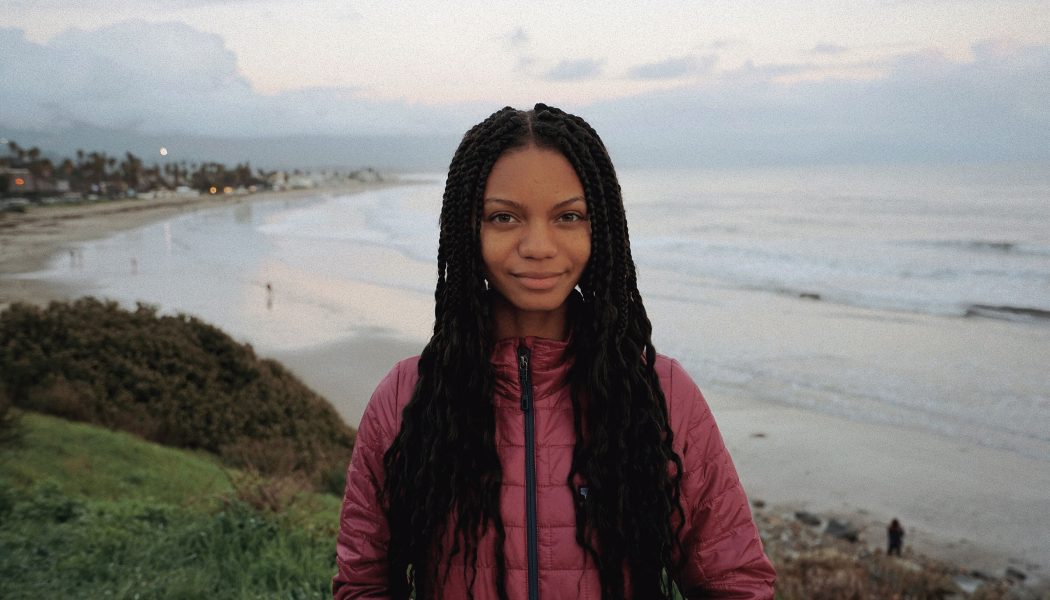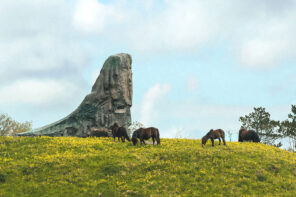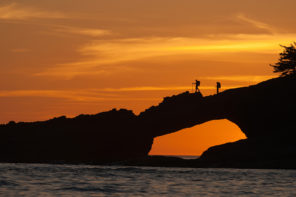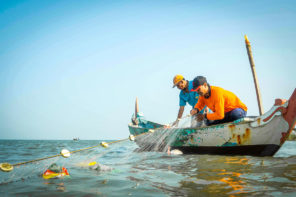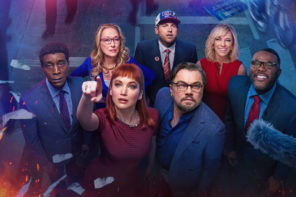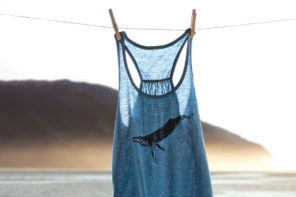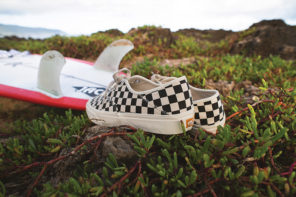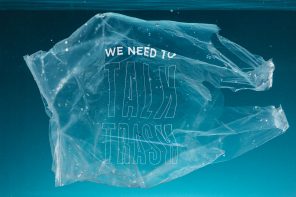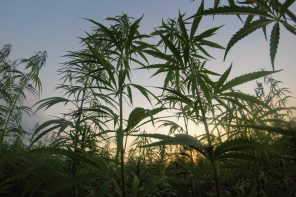Leah Thomas is bringing racial justice to environmentalism
There’s busy and then there’s Leah’s schedule these days.
The Intersectional environmental activist and JuneShine Ambassador has had a pretty full dance card with good reason. First there’s explaining to people just exactly what “intersectional activism”is—and we don’t know who needs to hear this, but it’s something that’s long overdue. Her voice is one that is leading the charge for the cause of intersectionality as it relates to racism and the environment.
It’s a new topic, or at least a new approach for most people, and Leah is at the forefront of helping educate people about the ways environmental issues can disproportionately affect and marginalize people of color. Leah’s platform is amplified by partnerships with companies who, like JuneShine, are committed to diversifying themselves. Meeting people with compassion and well-established research has enabled her to effectively spread the word to a country that, in its current mood, seems more willing to listen.
Leah studied environmental science and policy against the backdrop of the unrest in Ferguson after the fatal shooting of Michael Brown by a police officer, and hearing firsthand reports about it from her family in St. Louis. Couple this with the environmental disaster of Flint, Michigan’s water supply and the fact that Black and Brown communities are disproportionately located in areas with poor air quality, and the parallel tracks of racial injustice and environmentalism started to cohere. Now, think about this moment, when the Black Lives Matter movement seems at a tipping point—and one of its rallying cries, “I can’t breathe,” serves to graphically and literally connect the two movements—and you begin to get some idea of why Leah’s time is so in-demand.
We were fortunate to spend some time with Leah getting her insights on chewing gum and walking at the same time, how the environmental movement could and should address racism, and being be a better ally.
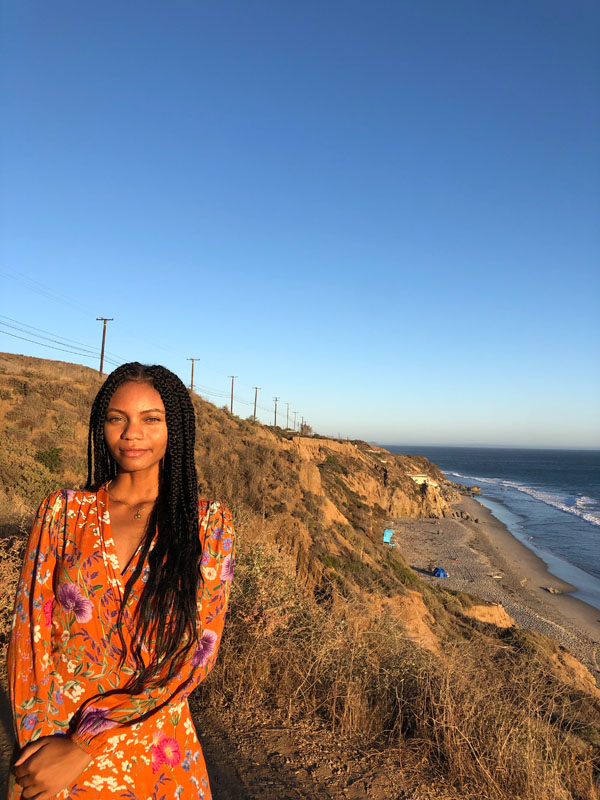
How did you come to see racial justice and environmentalism as intertwined?
Leah Thomas: I studied environmental science and policy when I was in school. And I’ve mostly been in primarily white spaces for a long time, sometimes primarily white conservative spaces. I went to school in Orange County, California, and I was, I think, the only Black person studying environmental science and policies. There was less than one percent of Black people at the school.
And I’m from St. Louis, Missouri, and at the same time as I was in school, the Ferguson uprisings were happening about 10 minutes away from my house in the aftermath of a police shooting. When I was taking my classes, I couldn’t really focus, understandably, because my mom and my sister were fighting for my civil rights and my sister’s getting tear-gassed—and I’m off trying to learn about the Clean Air Act. And it just felt very hypocritical, because I was wondering, who is the Clean Air Act for if it’s not for my community? Who is the Clean Water Act for if it’s not for Black and Brown communities like Flint or more low-income mountain communities in the United States? It started to seem the more I learned about environmental policy and all of this progress that we were making, it seemed, I mean, to be quite frank, that those laws were only for specific people, and those were non-minority people. When I dove into the data, it kind of confirmed my hunch that most, if not all, environmental injustices disproportionately impact minorities. And that’s from proximity to toxic waste sites, proximity to landfills, clean air, clean water, access to green spaces, and on and on.
My sister’s getting tear-gassed—and I’m off trying to learn about the Clean Air Act.
And if it were just one environmental injustice, it would be like, “Okay, maybe that’s a coinkydink.” But for it to be basically all of them, I had to step back and say, the environmentalism that we have today is not progressive, because having systems of oppression or racism kind of baked into environmental policy, that’s not progressive. So, even though most environmentalists that I know are really nice people, sometimes nice people can allow things to happen due to privilege. That’s where I really realized that environmental racism was a serious problem. And I had been studying intersectional theory and practicing intersectional feminism throughout college. Then I just realized after I graduated that intersectional theory could also apply to environmentalism. That’s why I developed the definition of what intersectional environmentalism meant to me. I’m sure other people have said that before, I’m not claiming to be the first, but when I put it online during the George Floyd protests, it kind of echoed across the internet. And I guess it became a thing, which is really cool.
And this movement has really been amazing to watch, it’s one of those instances where it seems like people realize that they can walk and chew gum at the same time. You studied intersectional feminism, which seems like a concept people are starting to grasp. Why is the intersectional approach to environmentalism overdue?
LT: Unfortunately, the kind of mainstream feminism, that was happening during the Women’s March, I remember having so many Black and Brown friends that were like, “Yeah, the Women’s March isn’t for me. That’s for the White women.” And I was like, “But that’s so sad because there’s this historic moment that’s happening.” But it was strange that it was only empowering for a certain demographic of women. And I think that wasn’t the case for everyone, but unfortunately sometimes when I was in that kind of mainstream non-intersectional feminist space, it was like, “Well, we don’t have to talk about race stuff. This is about, this is about women. This is about sisterhood. This is about uniting.”
But you can’t unite if you don’t look at the statistics of Black women earning even less than white women or Indigenous women earning even less than Black women. And Latinx women earn even less. So, not talking about the ways race or sometimes sexuality can intersect with someone’s experience as a woman, I feel is really silencing. And when that’s the case, we’re only advocating for the advancement of white women specifically.
And it didn’t really feel fair that I wasn’t allowed, in those spaces, to advocate for the entirety of my being and the entirety of my community. And it was also not fair to have the advancement of POC women come after we advocate for white women first. That’s why I love intersectional feminism, because it can consider the ways that race and identity and all these other things can also impact someone’s womanhood and the prejudices or the privileges that they might experience. That’s why I really gravitated towards intersectional theory, which was created by Kimberle Crenshaw, who’s also an incredible Black woman. And she gets kind of lost in the intersectional conversation.
With environmentalism, over time working with the National Parks Service as an environmental science major, working at Patagonia and at a lot of other really incredible top-tier environmental spaces. And I realized there was kind of this similar thing happening with people saying like, Oh, no, no, no. No, no, no. Race has nothing to do with the environment. Let’s just fight for this thing. Let’s just fight for the protection of, you know, waterways and things like that. But it seems like race is always kind of on the back burner, and I didn’t understand why. Especially given that People of Color are facing the threat of climate change at a faster rate.
I just realized that there is a sort of hypocrisy specific to environmentalists, because if we’re talking about Wall Street, that would be completely different. I don’t think anyone would expect Wall Street people to be intersectional. But I think it just started to become hypocritical because environmentalists are usually seen as very progressive, loving people. But progressive people aren’t usually racist, or progressive people hopefully want to advocate to uplift marginalized voices. And very prominent organizations are losing their Black staff. They’re fleeing from these companies because they’re no longer safe spaces. Environmentalists should consider being intersectional to make sure that Black people and People of Color are also being advocated for and protected in these organizations.
Why do you choose to work with brands like Patagonia and now JuneShine?
LT: I have always loved JuneShine. I just have always gotten JuneShine for probably the last two years. I just thought it was a really cute sustainable brand. I also used to work at Patagonia, and Patagonia’s a One Percent for the Planet partner and so is JuneShine. So, I just wanted to support another kind of innovative sustainable brand. And then when my Instagram started going viral about a little over a month ago, JuneShine was really supportive. Their founder or co-founder, Forrest reached out. They re-posted one of my graphics, Environmentalists for Black Lives Matter. And I just started talking with them a little bit about their commitment to diversity and inclusion and intersectionality. And they asked me to be an ambassador. And I also know, Kimi Swimmy, who is one of their ambassadors as well and she’s also a Patagonia ambassador. And she’s been just a really incredible person to talk to, that I’ve known through the Patagonia world.

What are the most pressing environmental issues we face?
LT: I’m definitely biased, but environmental racism. I think that’s a pretty big issue. But specifically, I think everyone should just have access to basic needs. Clean water—people in Flint still don’t have clean water. I think that’s incredibly important. Mountain communities that are primarily white but low income don’t have access to clean water and what they do have might have lead in it. Another thing that I think people should be focusing on is regenerative agriculture because it’s really amazing to see how capturing carbon in the soil can actually reverse some of the impacts of climate change. And to me, that’s one of the most obvious solutions.
Has the environmental movement been at cross purposes with racial justice?
LT: We can take it all the way back to the ’60s and ’70s. It’s definitely no coincidence that there was the Civil Rights Movement of the ’60s, and then right after, it was the Environmental Movement of the late ’60s and early ’70s, which lad to the creation of the EPA. All the laws that I’ve been referencing, the Clean Water Act, the Clean Air Act, they call it “alphabet soup” because so many environmental laws were coming out at the same time.
But I think what happened there is a perfect case study of what we can do better. The environmental movement basically adopted a lot of the techniques that were successful in the Civil Rights movement. And they were very inspired by the civil rights movement to be able to have demonstrations on the first Earth Day. And it kind of happened off the backs of the Civil Rights movement, I guess. But at that time, they didn’t realize, “Oh, maybe we would be stronger if we united.”
And something that a lot of people don’t know is the day before Martin Luther King Jr. actually died, he was advocating against an environmental injustice issue. They were getting really close to really embracing environmental justice in the Civil Rights movement. And how beautiful would it have been if we could’ve just united forces in that way? And then maybe our laws would have actually been infused with both social justice and environmentalism.
And how beautiful would it have been if we could’ve just united forces in that way?
But that’s okay. We can just look at that as a case study, because something similar is happening right now. We had a really huge environmental movement, Fridays for Future, The Kids Climate Strikes in 2019 and 2020. And now we have probably the biggest resurgence of the Black Lives Matter movement, so a civil rights movement happening at the same time. And I think people are realizing we can join forces because there are so many intersections between civil rights and environmentalism. And we could be much stronger and much more effective if we just kind of unite those groups of people.
How can we encourage productive conversations around race?
LT: Meeting people where they’re at with compassion because even as a Black woman, there are certain privileges that I have and I recognize. I lived in a two-parent household, and they both went to college. I think when I meet people with compassion and I don’t necessarily demonize them for it but just say, “Hey, here’s some of the data. Maybe this is something that you can consider.” It seems like people are more open to that conversation.
I’m not sure why it’s specifically race that is just a really difficult topic to talk about, specifically in my experience. Sometimes it seems like white progressive environmentalists think that their love of the environment shields them from ever being racist or having biases. I don’t want to even use the word racist.
What is different about this moment and the reaction to the murder of George Floyd that seems to have shifted from what happened after the deaths of Oscar Grant, Michael Brown, Eric Garner, and so many others?
LT: I don’t know if it’s because people are at home or what exactly was happening. I think it’s because people couldn’t look away. And we’re in this unique time of quarantine. So, I think these people couldn’t look away, and they couldn’t be distracted. And they had to sit there and really think about what their values and morals were. I mean, as terrible as right now is, I think there’s a lot of reflection that’s going on in the country.
As someone who is expert at communicating complex messages, interested in your point of view on the semantics of “Defund the Police.” Do you think calling it “defund the police” serves a specific purpose or could another name that more encompasses the policy shifts involved be more effective?
LT: I definitely agree with a lot of the actions of defunding the police—I don’t personally think we should be using military-grade equipment or tactics on protesters. I would just hope that people stop getting caught up in the semantics and do the research on what people are trying to say, because semantics are a really easy talking point for people to spin as radical and kind of say, “Look, they’re trying to get rid of the police,” or, “Look they’re saying Black Lives Matter and all lives don’t matter.” I would just rather not get wrapped up in the semantics.
I think it’s really important to realize that many of our grandparents, not mine [laughs] but many of our grandparents did not approve of Martin Luther King Jr. It was something like 60% of Americans during that time, did not agree with Martin Luther King Jr. They thought he was too radical. And we’re not even talking about Malcolm X here. We’re talking about the beloved Martin Luther King Jr. and 60% of our grandparents did not agree with this man. People didn’t agree with Gandhi and thought Gandhi was too radical, I think hindsight will be 20/20. And maybe 50 years or 20 years into the future, we’ll be able to look back and get a clearer view.
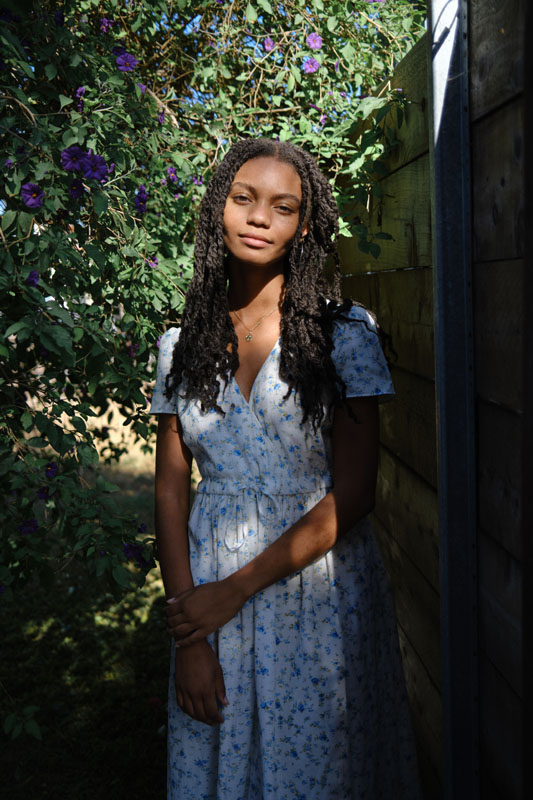
What does it mean to be a true ally?
LT: The biggest thing really is listening to other people. And this is something that I’ve had to learn along the way. Something that I’ve recently learned, when I launched Intersectional Environmentalist with my friend, we released all of these resources. And then we had a lot of people come forward and ask, “Where are all the disability resources? There are none.”
And that was a major oversight on my part as an able-bodied individual that doesn’t really think about accessibility a whole lot. And that was a privilege I had. And I think there was that pang of defensiveness at first that’s, like, “Well, you know, we were going to do something,” and blah, blah, blah. But then I realized you know what? I think it would be more effective to just listen, because usually when people are advocating for different things, it’s because they’re coming from a place of pain and just really wanting to be seen and heard. And sometimes people might even have a tone or they might have an attitude or they might be upset when they’re kind of calling you out. And just realizing like, hey, this probably isn’t personal, but this is maybe something that’s happened to this person all of their lives. And what can I do as an ally to hear them when other people haven’t heard them? I feel like the first step is really just kind of checking our own egos. I don’t believe when people say you can get rid of your ego, because we’re human. We all have them. It’s a normal thing. But just checking it and being sure to really just listen to people. In addition to that, just taking the time to get educated on your own. So, for me, with that disability example, what I didn’t do was reach out to all of my disabled eco-activist friends and say, “Hey, teach me about your trauma and your struggles. Recount the most traumatic thing that’s ever happened to you and convince me that I should care about disability.” That is not the way to go.
Just do that independent research. I started following people on Instagram that are disabled eco-activists. And I learned so much just reading their captions and things like that. There’s an incredible documentary, produced by Obama, which is really cool. It’s called Crip Camp on Netflix. And it’s just such a beautiful documentary about disabled rights in the United States particularly.
What steps should environmentalists specifically take to be better allies?
LT: I think a really good first step is really just letting the activists who are doing the work kind of lead the way. You can find some of those activists on the Intersectional Environmental Council. There are about 22 people at this point, and they’re all really diverse environmental activists.
And I think people will be blown away with what they can find and what action steps they can take. I’m just following these activists on social media and they will regularly post like, “Hey, if you want to support this community, here’s a protest, here’s a page you can donate to, here’s a petition you can sign, here’s a letter you can write.” And again, just learning from other people, like, what action steps you could take., I know that might sound a little passive, but sometimes being an ally is a little passive. And just listening to other people and listening to what they would like you to do to advocate for them.

